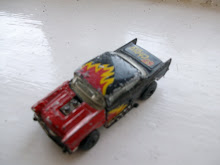I can't help but admit that I'm a total geek when it comes to the history of Manchester United. I love knowing obscure facts and trivia. The worst part is that I can't help correcting people on such things - such as the dad of a friend talking about us beating West Ham 6-1 in 1966 and me butting in "it was in 1967, actually".
Because of this, I've really enjoyed Andy Mitten's series of books featuring former players talking candidly about their careers. We're The Famous Man United and Glory Glory! covered the 1980s and 1990s, now United! United! does the same for the 70s.
It was the most turbulent – and least successful - decade for the club since the 1930s, with five managers overseeing the legendary Busby team of the 60s decline into relegation. A single FA Cup win (plus the Division Two championship) were all the silverware fans had to cheer.
From 1973 to 1977, the club was managed by the flamboyant Tommy Docherty. Though his first full season saw the club endure relegation, they bounced back with a style sure to make older Reds misty eyed, based on youthful energy and skillful wingers. In 1977, they defeated Liverpool 2-1 in the FA Cup final a year after losing out to Southampton – a victory made sweeter as it prevented them from winning an unprecedented treble that United themselves would do in 1999.
All looked good: the forward line of Jimmy Greenhoff and Stuart Pearson (both interviewed here) offered flair, strength and mobility, wingers Gordon “Merlin” Hill and Steve Coppell had pace, unpredictability and industry backed up by young full backs Jimmy Nicholl and Arthur Albiston. The general view was that United would challenge for the big prizes.
Days after the cup victory, it was revealed Docherty was having an affair with the physio’s wife and was sacked with immediate effect. He was replaced with the more sedate Dave Sexton, whose more studied style of play never endeared him to the crowd, not helped by his sale of Stretford End heroes Hill and Pearson, replaced by the industrious Mickey Thomas and aggressive target man Joe Jordan.
Being a well- known hardcore United fan doubtless worked in Mitten’s favour in getting stories from the former heroes. We get honest opinions on teammates and managers. Martin Buchan, captain throughout the second half of the 70s into the early 80s, is complimented by many for being a great leader but is also described as "maybe not as intelligent as he thought he was" by another.
The managers also polarise opinion, especially Sexton, who did have his admirers in the team, such as Lou Macari while others believe the job was too big for a man who intensely disliked dealing with the press.
More so than the previous books, subsequent fortunes of the players after United vary wildly. Joe Jordan is enjoying no little success as assistant manager to Harry Redknapp at Tottenham Hotspur and Sammy McIlory has done wonders as manager with both Macclesfield Town and Morecombe. Gordon Hill runs a soccer school in Texas while Buchan (stated as being "cooler than the Fonz" by fans impressed by his smooth style on and off the pitch) works for the Professional Footballers Association.
At the other end, cult hero Jimmy Greenhoff lost everything when he was a cheated by a partner in an insurance business and, sadder still, has not spoken to his brother Brian, also a United player in the 70s, in decades. Gerry Daly (of the chant “five foot eight, underweight, Gerry Daly’s fucking great”) has suffered terrible personal tragedy and ill health. Several players remember Scots hardman Jim Holton, whose United career was stopped in an instant by a broken leg at Sheffield Wednesday and would die of a heart attack aged 42. Mitten fondly recalls the crowd’s chant of "six foot two, eyes of blue, big Jim Holton’s after you" by stating the man was six foot one, had brown eyes and if he did want to get after anyone, he’d have needed a motorbike to do so. All the same, Holton was good enough to represent Scotland in all three of their undefeated games at the 1974 World Cup, including a credible draw against reigning champions Brazil.
It’s true that this generation of players may be the last for whom playing for one of the biggest clubs in the world wasn't a ticket for life. Many have gone back to "normal" lives once the playing days ended: much-maligned reserve goalkeeper Paddy Roche works as a delivery driver, something you can never imagine a current top-flight player ever having to do outside gross financial mismanagement. Indeed, Lou Macari expresses incredulity when he hears of a "fringe" United player of today buying a £900,000 apartment.
The only negative I take from the books is that I'm jealous of the author for living my dream job - but at the same time I recognise the hard work the guy has put in since founding United We Stand when he was 15. True Reds won't do much better than investing in to his fine work documenting the history of our club.
Subscribe to:
Post Comments (Atom)

No comments:
Post a Comment